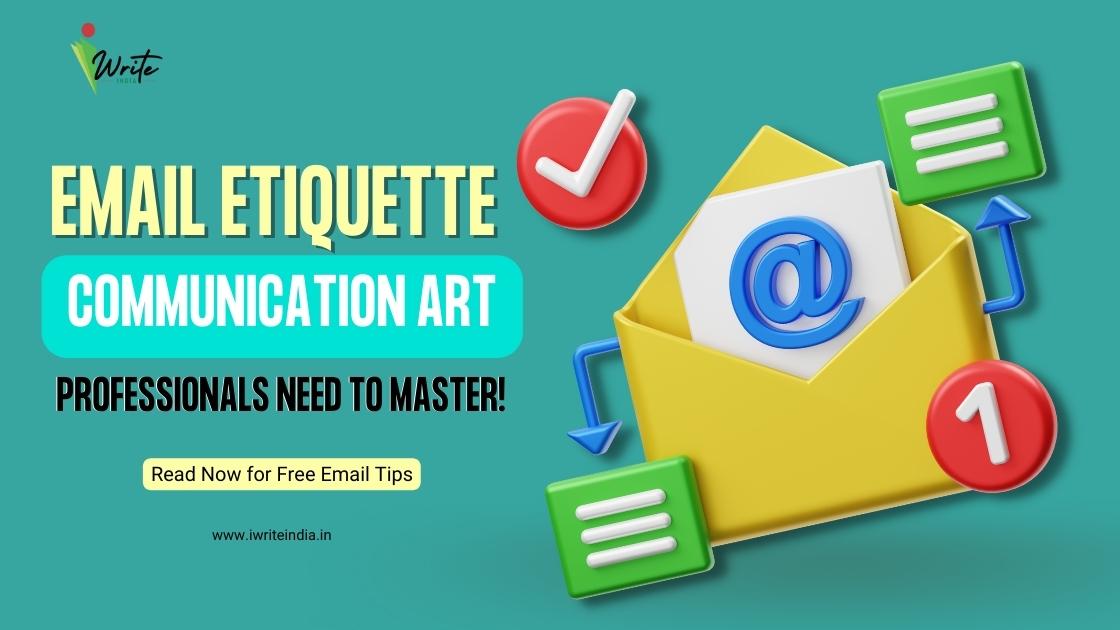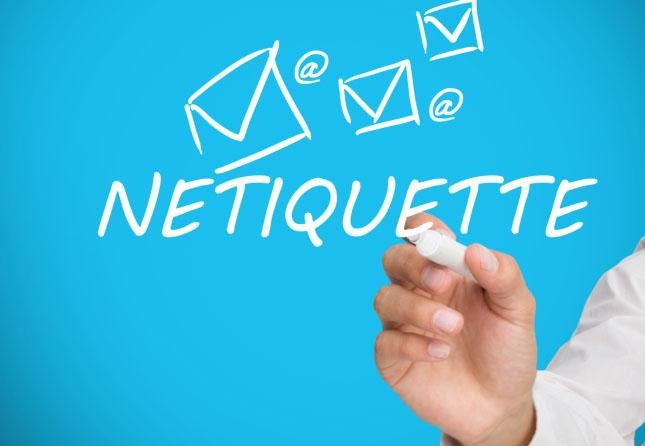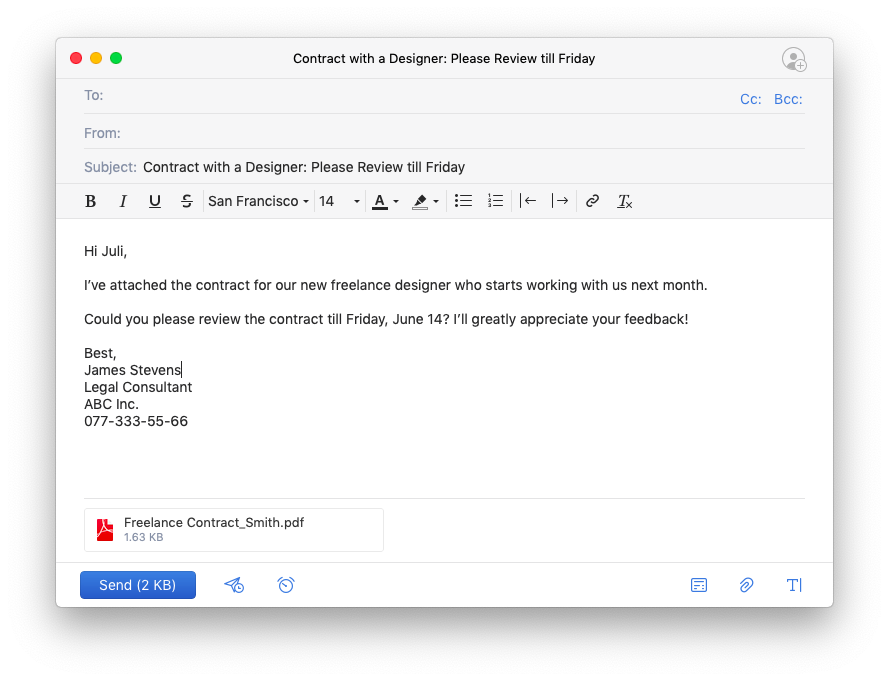
When the concept of e-mail entered the market, it was revolutionary. Nobody in the business community anticipated the big switch would be from writing letters or sending faxes to sending emails. Today, it is nearly impossible to imagine a world without emails. So much so that even the hyphen in the e-mail has now disappeared. This is actually the time to follow good email etiquette.

(Source: MayeCreate Design)
Email’s speed and accessibility make it very desirable. However, the speed often being akin to instant messaging can create an illusion of informality. This is especially hazardous in decidedly professional and formal settings such as in a job.
This brings us to the main point of the article: how do you master the art of the professional emails?
Let’s dive right in!
Be Concise
Long emails are unappealing and can cause disinterest quickly. If you want to get things approved, this is not the way to go. Be concise and to the point. Present all your information is a crisp and wholesome manner. Use bullet points if necessary rather than long sentences and large paragraphs. This is imperative to email etiquette.
Additionally, always ensure that your subject line is direct. Your subject line sets the stage for what they can expect from your email. It needs to reflect your email. Keep it objective and informative. This way, when the recipient reads it, they know what to expect and are in the right mindset.
Use Strictly Professional Language
Whether it is the greeting, the sign-off or the main body of text, professional language is a must when sending professional emails. Apart from being concise, you must also be extremely cautious of the words and structures you are using. No informal abbreviations (LOL, OMG, etc.) should be used in any professional communications. Avoid humour in the mails (unless completely unavoidable) as it does not necessarily translate well over text.

(Source: Sparkmail)
Even if you have an established interpersonal relationship, maintaining this boundary between professional and personal can be highly beneficial. It helps keep self in check and establishes a good email etiquette for email compositions, should you not share such a relationship. A good rule of thumb here is to imagine you are putting up the email on a bulletin board. What kind of language would you use if the entire company could see it? That is what you need to use in your professional email.
Greetings and Sign-Offs for Professional Emails


(Source: Sparkmail)
In your greetings, if you are addressing someone within the organisation, you normally should stick to “Hi” or “Hello”. If you are writing to an external person, use “Dear ma’am/sir/<insert name here>”. Remember, when writing to an external person or organisation, always introduce yourself within the first sentence. E.g. “I am <insert name here>, a content writer at iWrite India, Delhi.” Use the next sentence to lay out the purpose of writing the email. If you have already spoken to them, you may allude to that (“As per our conversation…”).

(Source: Wondershare PDFelement)
Always include a signature at the end of your professional email with your full name, designation, company name, and contact details. Some companies provide you with a staple company signature with your email ID. If yours does not, or you are a university student, provide these details at the end. Gmail and other such email services allow you to set up automatic signatures so that you do not need to add it every time and can focus on the core email.
Always Proofread Your Emails – Very Important for Email Etiquette
We all have had that experience where we send an email or turn in a project without proofreading. This means typos, run-on sentences, bad structure, and more. While these mistakes may be all right while you’re a student, at a professional level, they are unacceptable.

(Source: Business2Community)
Proofreading your email is essential. You need to check everything.
Are you sending it to the right people?
Have you made any mistakes?
Are your sentences too long?
Is there any unnecessary or confidential information?
Only after double-checking everything should you send the email. Remember, once it’s gone, it’s gone forever along with your silly mistakes. Avoid that!
Rule of Thumb – Never Email Angry
If proofreading is a must, so is keeping your emotions in check. Did you get a stern email that makes emotions flare-up? Maybe your team is not working well, and their lack of work ethic irritates you? Either way, emailing angry or emotionally compromised in any way will undoubtedly make the professional email, unprofessional.


(Source: DLPNG)
Lindsey Pollak is a career and workplace expert, email etiquette consultant, and the author of Getting From College to Career. She says, “E-mailing with bad news, firing a client or vendor, expressing anger, reprimanding someone, disparaging other people in e-mails (particularly if you’re saying something less than kind about your boss) are all major no-no’s. Because e-mail can seem so informal, many people fall into this trap. Always remember that e-mail correspondence lasts forever.” Allow a cooling period when you are flared-up.
Only Send if Relevant
Refrain from replying to emails with “OK” or “Got it” or other such one-liners unless the acknowledgement is asked for or expected. A similar rule applies to people. Before hitting “Reply All” ask yourself if everyone actually needs to know.

(Source: Mailtrap)
It would help if you also kept people confidential using BCC rather than including an impossibly long list of recipients. Including multiple people in the “To” line is also a strict no. Use CC if the people can see each other and if there are only a few. If you need to send it to multiple people and they do not have to know everyone else, use BCC. This makes replying to you also much more comfortable.
Always Reply
You must always reply to a professional email as soon as you see it. Leave it unread if you cannot respond right away. That way, the notification stays, and you will see it later, and your chance of responding increases. Responding at an appropriate time is also a crucial part of email etiquette.
Emailing is truly an art that improves your work communication manifolds. It eventually establishes you as a domain expert and a reliable professional. Keep it simple and keep it extremely effective!
At iWrite India, the leading email marketing agency in Delhi, we always respond to our emails professionally and concisely. Our content writers also specialise in creating remarkable content for emailers and newsletters to help you optimize your email game and marketing strategy!
Let’s connect and discuss your content needs.


